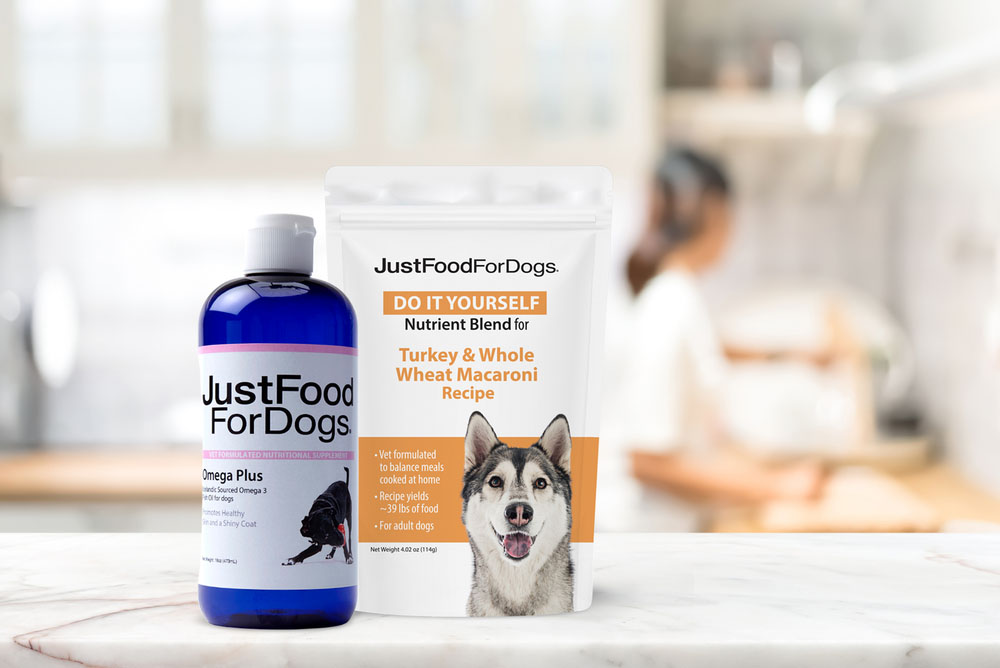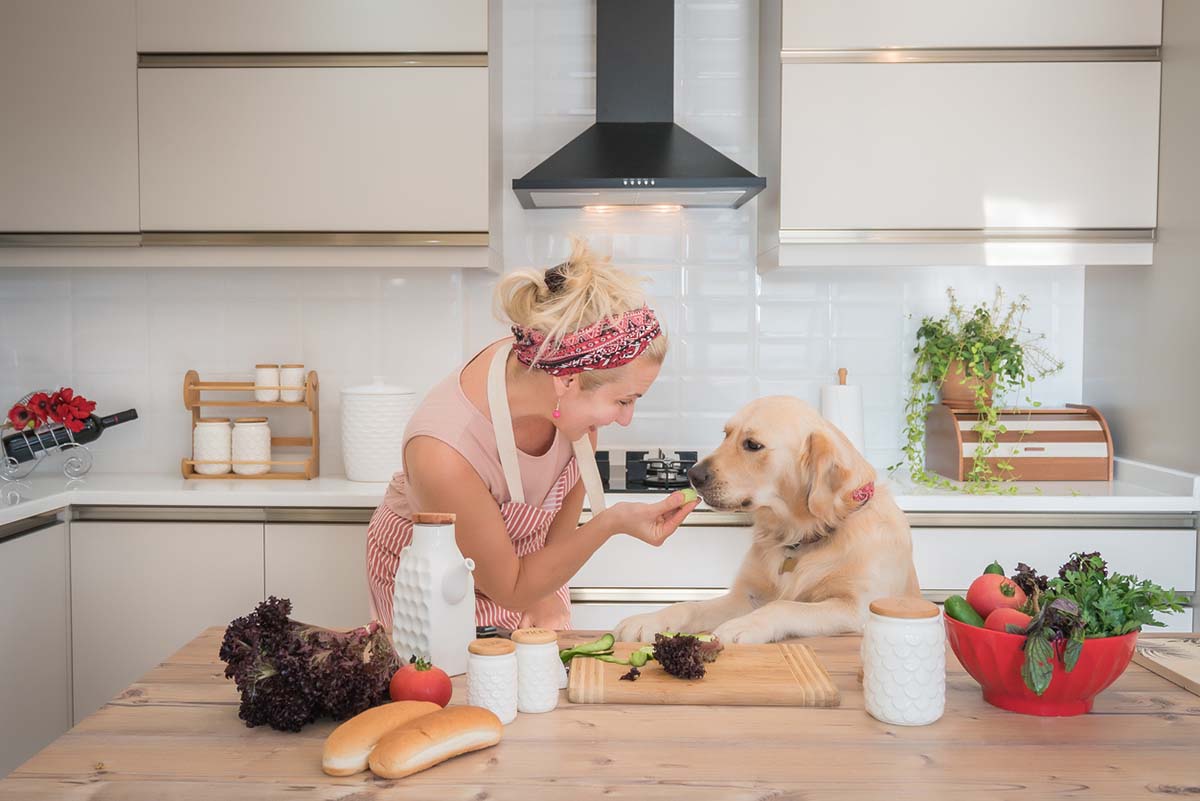With pet owners dismayed at the highly processed dry kibble and other unknowns of store-bought dry dog food, many are opting to make their dog’s food at home. Vet-recommended nutritionally complete homemade dog food recipes ensure your dog gets a truly balanced diet.
Feeding your dog a nutritionally complete homemade diet is a great way to ensure that they are getting the nutrients they need to stay healthy and active.
While it may seem daunting at first, it is actually quite simple to make homemade dog food that is both nutritious and delicious. If you’re comfortable making simple boneless chicken breast and rice when they’re feeling sick, you can easily make a complete and balanced meal, too.
Our vet-approved dog food recipes

Our dog nutrition experts make cooking at home for your dog easy! You supply the whole-food ingredients, we supply the recipe and shopping guide, the nutritionally balanced nutrient blend, and easy-to-follow cooking instructions.
Dog owners can make any of our nutritionally balanced dog food recipes right at home by using our vet-formulated DIY Nutrient Blends. These nutrient blends balance meals cooked at home when made using our recipe instructions.
Click on one of the following homemade dog food recipes to get started:
- Lamb & Brown Rice
- Venison & Butternut Squash
- Chicken & White Rice
- Fish & Sweet Potato
- Ground Beef & Russet Potato
- Ground Turkey & Whole Wheat Macaroni
Head to our recipes page for instructions on how to make these fresh food meals for your dog on the stovetop, slow cooker/Crockpot, or Instant Pot. We have dog treat recipes, too!
Related reading: DIY Dog Food Meal Prep Hacks
Custom homemade dog food
If your dog has special needs, food sensitivities, or food allergies, schedule a consultation with our team. Our veterinary whole-food formulators will review your pet’s medical records and partner with you and your vet to discuss custom dietary options that best fit your pet’s needs.
If you want to make your pet’s custom diet at home yourself, you will receive a list of healthy human food ingredients to purchase and a recipe to follow. We will hand-prepare your pet’s custom nutrient blend, formulated for your pet’s unique recipe. Custom nutrient blends are prepared to pair specifically with your dog or cat’s diet to ensure it is nutritionally balanced for their overall health.
Tip: If you can’t find ingredients like chicken liver, beef liver, or gizzards at the grocery store, try your local butcher.
What are the essential nutrients for dogs?
Your dog’s diet requires a variety of essential nutrients, including:
- Protein: Protein is essential for building and repairing tissues. Good sources of protein for dogs include meat like ground beef, poultry like ground turkey, fish, eggs, and dairy products.
- Carbohydrates: Carbohydrates provide energy for the dogs. Good sources of carbohydrates for dogs include grains like brown rice and quinoa, vegetables like zucchini, sweet potatoes, and green beans, and fruits like blueberries and cranberries.
- Healthy Fats: Fat is essential for energy storage, cell function, and vitamin absorption. Good sources of fat for dogs include vegetable oils, omega-3-rich algae oil, fish oil, and animal fats.
- Vitamins and minerals: Vitamins and minerals are essential for a variety of bodily functions, including digestion/gastrointestinal health, immunity, and bone health. Good sources of antioxidants, vitamins and minerals for dogs include fruits, vegetables, and organ meats.
- Water: Water regulates body temperature, maintains hydration and fluid balance, and lubricates joints and eyes among many other functions. Always keep plenty of fresh, clean water available for your pooch.
Related reading: What Nutrients Do Dogs Need?
Making your own dog food is a great way to ensure that your dog’s nutritional needs are met. It can also be more affordable than buying commercial dog food.
However, it’s important to make sure that your homemade meals are nutritionally complete. Adult dogs have different nutritional needs than humans, so it’s important to do your research and make sure that you’re giving your furry friend everything they need to stay healthy.
Tips for Making Dog Food at Home
Here are some tips for making nutritionally complete homemade food for your dog’s health:
- Use a variety of human-grade ingredients. Dogs need a balance of protein, veggies, carbohydrates, fats, vitamins, and minerals. To ensure that your dog is getting everything they need, use a variety of ingredients in your recipes.
- Include a protein source. It’s no secret dogs love meat. Protein is essential for dogs’ muscle growth and repair. Good sources of protein for dogs include meat, fish, and poultry.
- Add a carbohydrate source. Carbs provide dogs with energy. Good sources of carbohydrates for dogs include rice, pasta, and potatoes.
- Don’t forget the fats. Fatty acids are important for dogs’ skin and coat health, as well as for their energy levels. Good sources of fat for dogs include vegetable oil, fish oil, and coconut oil.
- Add vitamins and minerals. Dogs need a variety of vitamins and minerals like calcium, potassium, manganese, etc. to stay healthy. You can add these to your homemade pet food through our DIY Nutrient Blend supplements.
Tips for home cooking healthy dog food
- Use fresh, high-quality ingredients in your homemade recipe that meet your dog’s nutritional requirements.
- Avoid ingredients that are seasoned, heavily processed, or canned.
- Gently cook the ingredients, especially the meat. Do not serve your dog raw dog food.
- Let the food cool completely before serving it to your dog at mealtime.
- Portion your dog’s meals according to your dog’s weight and activity level.
- With new food, start slow an gradually make the transition.
- Store the cooked dog food in an airtight container in the refrigerator or freezer.
As always, talk to a veterinary nutritionist about finding the right homemade dog food diet for your dog’s needs. This is especially important if they have food sensitivities or other health issues.
This content is for informational use only and does not replace professional nutrition and/or medical advice, diagnosis, or treatment. It is not a substitute for and should not be relied upon for specific nutrition and/or medical recommendations. Please talk with your veterinarian about any questions or concerns.
